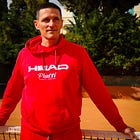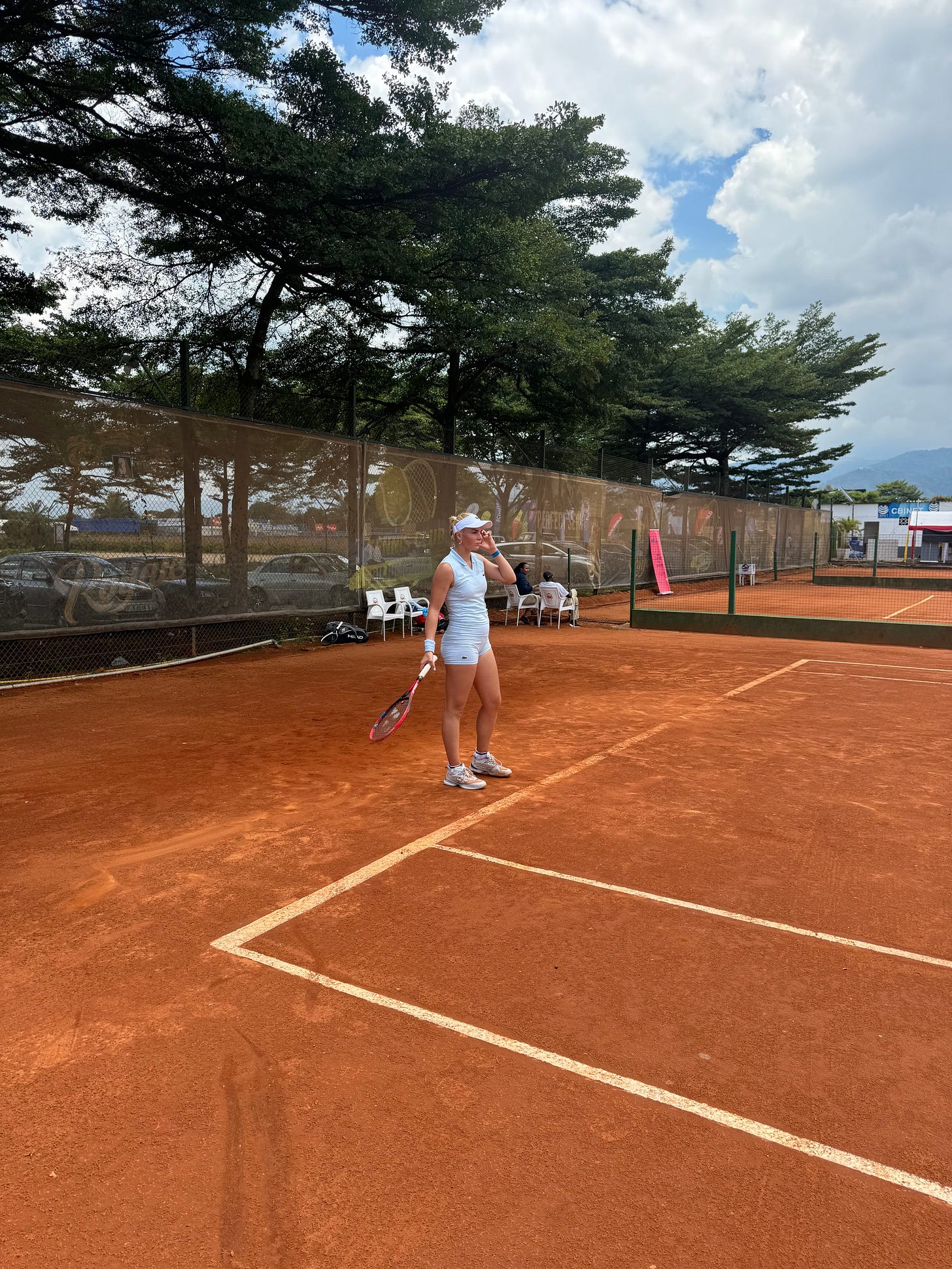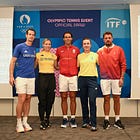A Small World and A Family Affair
Novak Djokovic is revamping his team ahead of Wimbledon. Read also an interview with tennis hope Alyssa Reguer and her parents about the reality of the family projects in tennis.
Welcome back! Oh, that’s a popcorn one today! I’ve arrived at Wimbledon and I’m already coming with the goods. So scroll to read all about the new addition to Novak Djokovic’s team and also how Mikael Tillström is now in Denis Shapovalov’s coaching team. Telling you, I couldn’t possibly know, but TSS has really been talking to the right people lately lol! I’m also sharing my Wimbledon arrival routine and will try to share more backstage action along the way.
I’m then bringing you an exclusive interview with a young, upcoming player, Alyssa Reguer, and her parents. Alyssa lands in what tennis calls the family projects. I wanted to show (again) two things: 1) The norm isn’t to be Mirra Andreeva or Coco Gauff, already at the top of the game in their teens, 2) Deciding to become a professional tennis player is a story of utter commitment, and that it takes many shapes or forms. I hope it’ll help to shine a light on what it really involves when a child says they want to be a champion.
This publication is supported by readers, so if you like what you’re reading, don’t hesitate to spread the word, try a paid subscription, like this post, or leave a comment, as it helps TSS discoverability. You can also prefer to buy me a cuppa!
WIMBLEDON (H)
Look who joined the Djokovic party!

The tennis world is such a small world. Especially at the very top of it. And, as far as Novak Djokovic is concerned, it often comes back to one of his former mentors, Riccardo Piatti. After all, he has hired Claudio Zimaglia last year as his new physiotherapist/Osteopath, and Zimaglia is also tied to the Piatti Tennis Center. Hence why I shouldn’t have been that surprised to find out that he had brought strength and conditioning coach Dalibor Sirola, Head of performance at the Piatti Tennis Center, to his team. But yet, I was! And I’m even happier that TSS readers have been able to get to know Sirola more, thanks to the “Tennis Journey” Series.
So what exactly happened? Well, TSS has the details ;) I caught up quickly with Sirola as he was on his way to Djokovic’s training session at Aorangi Park. We had a good laugh when he told me Novak asked him to join the team around the time we did our interview. Yet, Sirola had to decline as he had too many commitments already for the clay season. “I couldn’t, really, I was already too busy,” he told me. He let the door open, though, if Djokovic still wanted to work with him when the grass season came. “And here I am!” And voilà.
If you’ve read our interview, you’d know Sirola is all about challenges. I reminded him about this quote, and he had the biggest smile on his face, “Well, I guess I couldn’t really find a greater one here!” Sirola has joined for the grass season, but the idea is that he’ll stay. If you had seen the smile on his face while chatting about the new situation, you’d understand what that means, even for the most experienced tennis professionals, to get a shot at working with a name like Djokovic. It’s always a career-defining moment. Usual faces of the Djokovic team are missing here, like long-time fitness trainer Gebhard Gritsch and long-time physiotherapist Miljan Amanovic, but the latter had a health emergency during Roland-Garros.



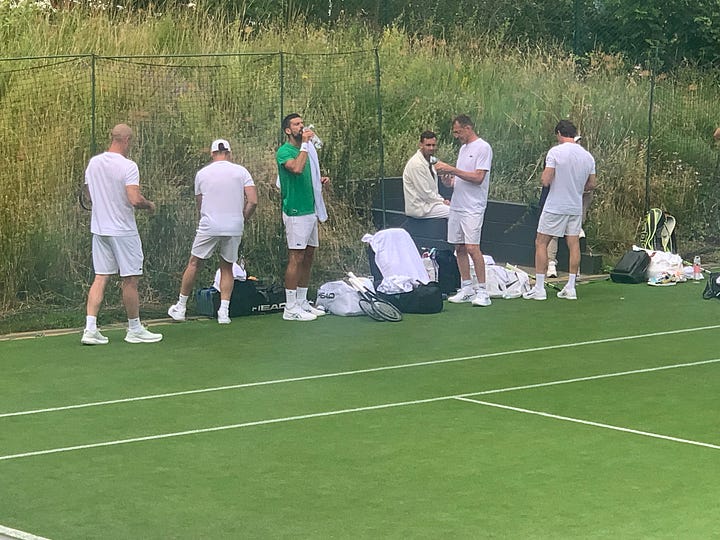
Now that Wimbledon lets (very top) players hit on Centre Court and Court 1 ahead of the start of the event, it allows for some blockbusters. On Thursday, Carlos Alcaraz and Novak Djokovic got the honor, followed by Jannik Sinner and Daniil Medvedev.
I had time to watch Novak and Carlos, and, gosh, the ball striking was crisp and clean. They had placed a microphone on both players at the start so that the broadcast could capitalize on the moment. They weren’t disappointed when asking Novak about Carlos’ level on grass, the Serbian answered in a laugh, “Whatever he’s been doing in Ibiza the past few years…” Later, Alcaraz hit a ridiculously good 1H backhand pass down the line on the run, laughing while telling Djokovic, “I closed my eyes!”.
Wimbledon 2025 - Backstage Views
I thought it could be nice to add a section about some of my reporting-duties moments throughout that Wimbledon. I’ve been covering the event on-site since 2013, the year Marion Bartoli won. As a French person, let me tell you that it was quite the Debut! I LOVE that place because it’s a Grand Slam with a club feeling and you only get it there. Also, no night sessions and curfew at 11 pm: that’s the only Grand Slam where I’m sure I’ll get some sleep!
Like tennis players, I do love my routines! And so it’s always special to start doing the Wimbledon routine again. Taking the tube (we don’t say metro or subway here) to Southfields station, seeing the usual shops, the good old streets, then ending up walking uphill to reach the accreditation office and be rewarded by this view (above) of the whole stadium. Then there’s nothing like being able to walk the Wimbledon grounds when there’s barely a soul around. Qualifications not happening on-site make it possible. It’s just such a cute vibe.




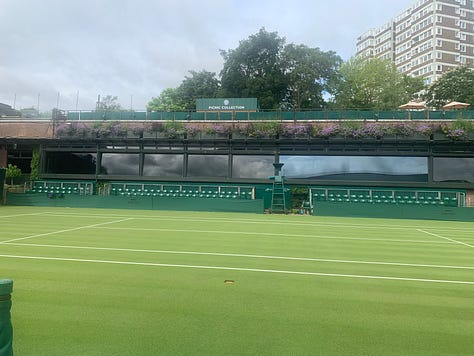
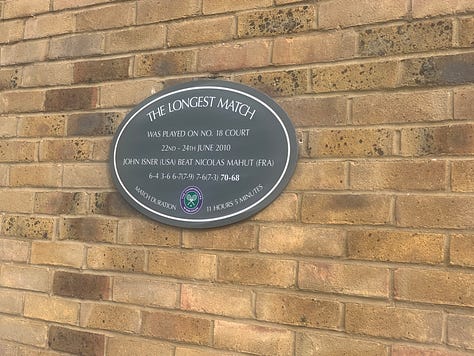
Also in my “arrival at Wimbledon” routine: walking around the grounds, having a look at the grass while it’s still immaculate, and setting up my office before going to see training sessions at Aorangi Park (probably the best practice setup of the Tour, really). I got a really nice spot near a window where I can see players, coaches, umpires, and sometimes VIPs walking by. I’m curious by nature, so this is a dream spot. Tennis With A View. Shout out to Roland-Garros, as you can see, I’m still repping the French vibe even in London. Also nice on the first day here is crossing all the staff I’ve been seeing for years now, and who’s always absolutely lovely. Tennis is a small traveling world!
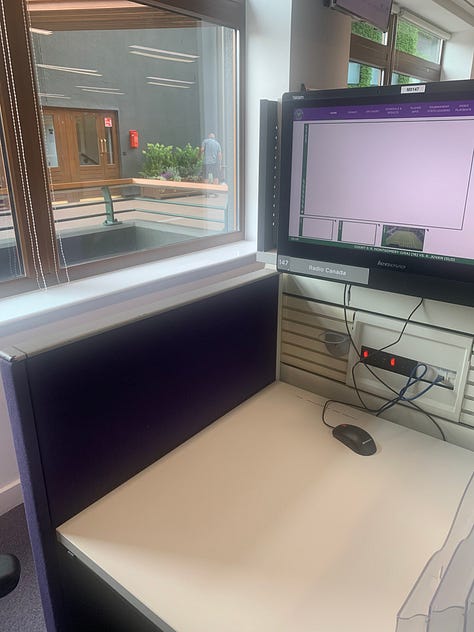
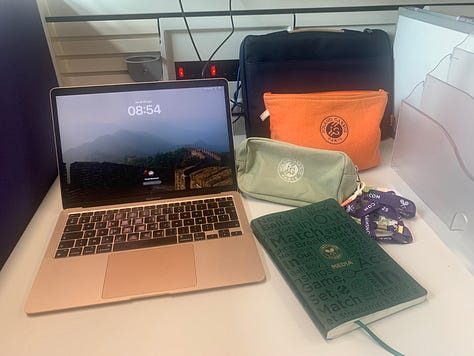

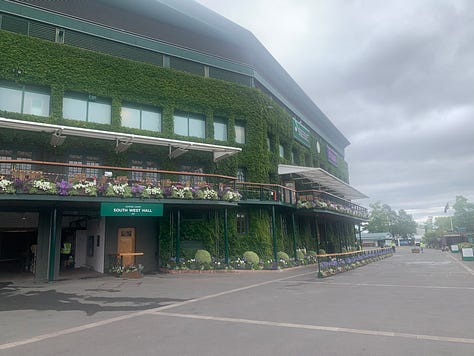
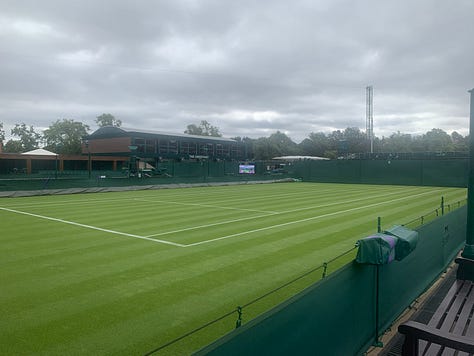



Not-so-fun facts that happened to me today for my first landing on-site: I was the only desk with a missing key for its locker, I also couldn’t be found on the desks list but thankfully I know where my desk is and there was my name on it, and finally my daily food allowance was somewhat suddenly terminated. Everything has been solved, except for that computer bug that won’t let me buy food. It will be resolved eventually, so everything should be fine soon.
A FAMILY TENNIS AFFAIR
Alyssa Reguer is the best French female player born in 2006 and one of only five teenagers in French women’s tennis ranked in the Top 700. Yet, Reguer is one of these special tennis projects that French tennis has historically struggled to manage: the family projects. Deemed not good enough by the federation system when she was just a kid, Alyssa Reguer found another way to follow her dreams thanks to her parents. Her mother, who had been a tennis coach for decades, took over her training, and her dad became the general manager of the rest.
For over a decade, Alyssa and her family have been building her tennis career on their own. I first met Alyssa and her mother on a shoot for Le Coq Sportif, her sponsor at the time, when Alyssa was 14 or 15 years old. I then crossed her again while she was training at Roland-Garros with her mom and Patrice Hagelauer (one of the experienced ones of the French system) on the side. Reguer was already very athletic and had a really powerful game for her age: the kind that would raise an eyebrow, not the usual one. Having watched many junior events at Slam level, I’m sure she would have given a run for their money to many of the top juniors. But Reguer, again, had chosen another path: She was already playing professional events.
So I kept an eye on her results here and there, heard about her struggles with injuries, then saw her comeback, and when she broke the Top 600 and then the Top 500. If you don’t know, French female tennis is hitting a wall that the amazing run of Loïs Boisson at Roland-Garros cannot hide. We only have two players in the Top 100 and none in the Top 50. And we’re desperately lacking young players coming up. So I found it interesting to see Reguer, on her own, improving at her own pace, but steadily, and I reached out to her and her family to see if they’ll agree to share their journey. Family projects in the tennis world are common and can go both ways, but it’s always interesting to me to hear from the inside how it happened and how it’s working. I’m sure many other parents and kids with a dream wonder the same. So I’m grateful to the Reguer family for agreeing to pull the curtain a bit on that different tennis path.
HOW DID IT START?
Carole Bouchard, The Tennis Sweet Spot: Well, let's start with the beginning. How did you come to tell yourself you wanted to become a professional player?
Alyssa Reguer: I started playing tennis when I was four or five. I was on the court with my mum. I always had a racket in my hand; I always wanted to play. It was really very natural to me. Gradually, I started training more and more, and then, at the age of 10 or 12, I realized that I had always had that ambition within me since I was young. I wanted to be a champion and make this a part of my life. And now I'm where I want to be.
Carole Bouchard, The Tennis Sweet Spot: Your mother was a player too, if I'm not mistaken.
Alyssa Reguer: She was a former professional player and also coached in Russia and now in Paris. But now she only coaches me.
Carole Bouchard, The Tennis Sweet Spot: And when you're a parent, because a child has dreams, but at what point do you say, “OK, I'm following her, let's go!”?
David Reguer: Oh, well, quite naturally. In fact, things happen quite naturally. It's true that, as she said, when she was very young, after school, she would join her mother, who was coaching on the court. She showed a passion for the game at a very early age. And then afterwards, we had a big discussion about it when she was 12 years old. I explained what it would mean to make that choice.
“We had a big discussion about it when she was 12 years old. I explained what it would mean to make that choice,” David Reguer
She was still quite young, but she already understood what it meant in terms of commitment, work, and discipline. And I told her that if we do this, we must do it because it brings us joy, and that joy and pleasure must always be superior to the rest, because otherwise it doesn't make sense.
Carole Bouchard, The Tennis Sweet Spot: There is an obvious maturity in Alyssa, and it's important in a project like this to feel that the child is really also a part of it.
David Reguer: Yes, it's a bit like that. I don't think we would have gone into this project if it weren't for Alyssa's choice. It shouldn’t be the parents' choice, but the child's. And then we accompany it.
Alyssa Reguer: I agree 100% with what he says. It's really my choice. And then they are there to accompany me and to bring me as many things as possible. And then I think the particularity and huge advantage of having my mother as a coach, of course, and my dad, who accompanies me in the project, is knowing that they truly want only your good. And that there is no intention behind that. They really want only your good, only your happiness. They only want to make you progress. And you can really trust them 100% blindly because they’re your parents.
BIG DECISIONS TO TAKE EARLY
Alyssa Reguer: When I was young, I wasn't necessarily the best. I had a separate project, because from the age of 8, I wasn’t picked up by the system, as I wasn't strong enough. I didn’t have access to the tournaments in France, so I had to build the project myself with my own team and not rely on, for example, the federation’s system. After that, I've always been on my own, and I quickly progressed to play in international tournaments. I quickly faced the reality of the level at Tennis Europe, and then, around 13 years old, I started playing at the junior level. However, unfortunately, at 14 years old, I began a two-year period of injuries. I was able to do a few tournaments, but overall, I was often injured.
It was very hard mentally because there were no results, compared to someone like Mirra Andreeva, who, at 14 years old, was already winning a lot. At that time, I was injured and couldn't play; I could only wait. I had to be very resilient, to work on something else because I couldn't go on the court. And then, after my injuries, I went straight to the 15K, in the qualifications. So, in quotes, I did my ranges. I wanted to do my ranges at the juniors. So instead of learning the job at the junior level, I did it in the qualifications of the 15K.
Alyssa Reguer: So at the beginning, it's not easy because you play stronger girls, older girls, who are adults, who have a lot more experience, who also play to pay for their life. It's not at all the same state of mind as the juniors. And after that, little by little, I earned my first points, then got a ranking very quickly, and, as soon as I realized that I had the ranking to get into these draws, I said, “Well, what's the point of coming back to the juniors?” Also, I clinched some victories against juniors’ Top 10, Top 20, or Top 30, so I knew the level was there and that I didn’t need to leave to prove that I can be strong at the juniors’ level. I did my learning at the 15K level, and now I am 600, so it’s moving up.

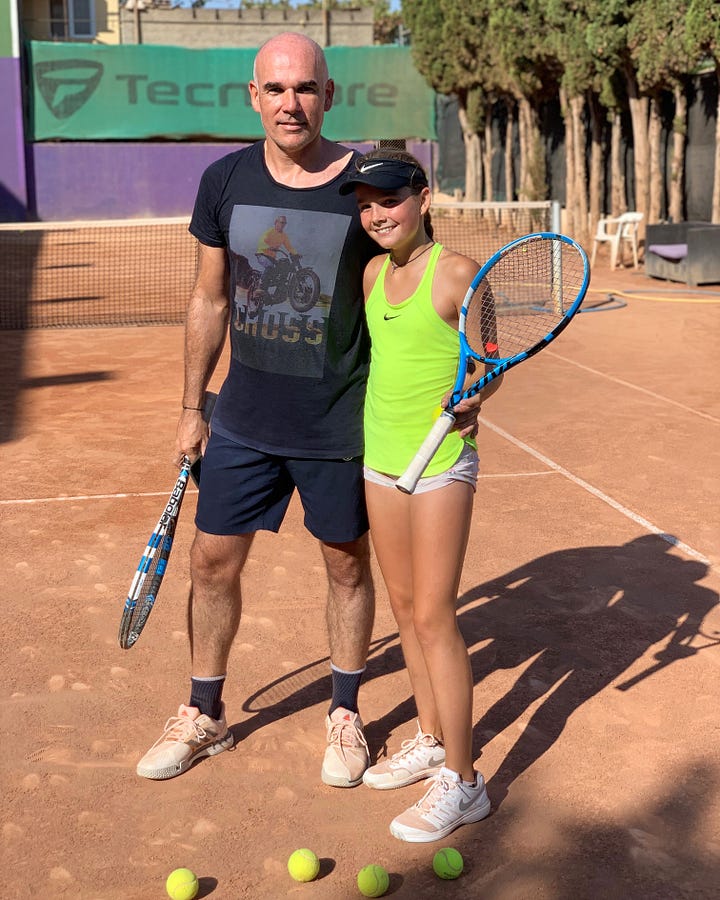

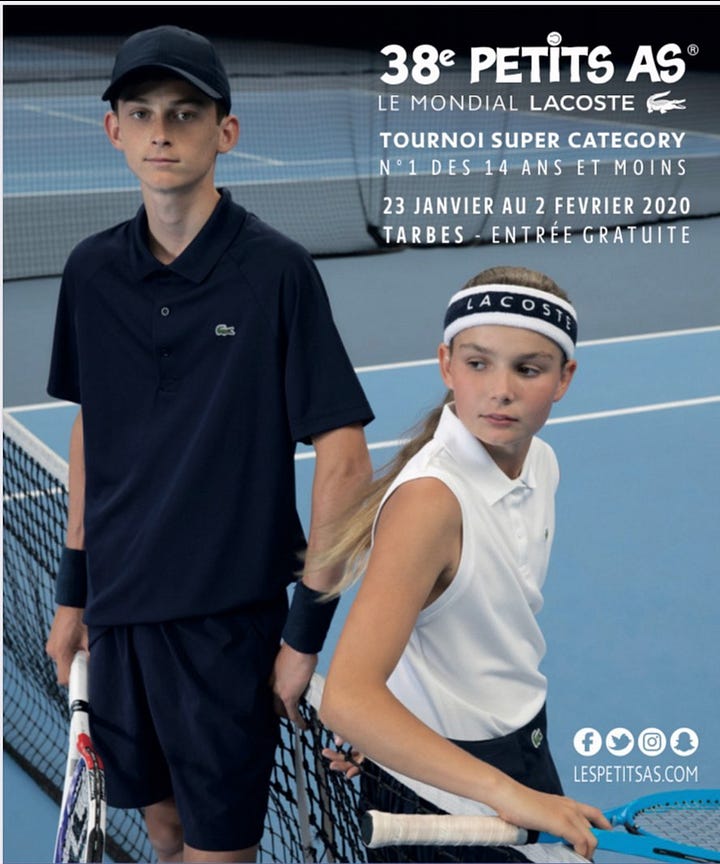
A DIFFERENT YOUTH
Carole Bouchard, The Tennis Sweet Spot: In relation to the discussion you had with your parents when you were 12 years old, now with hindsight, did you imagine it would be so hard, require so much discipline? Do you think you were right anyway?
Alyssa Reguer: Yes and no. From an early age, even at 12 or 13 years old, I worked a lot. I spent a lot of time on the court, and I always wanted to win a lot. In itself, discipline and work, that's not what the problem was for me. I've always had it naturally. It was more about how I could manage this desire to win and deal with my emotions. Today, I think even at 12 or 13 years old, I still had a little awareness of what it meant. I think that in every high-level sport, especially tennis, you have to be professional at a very young age. It’s a lot of discipline, a lot of work.
You stop school pretty early, and by this, I mean stop going to school as you start doing it remotely. There are a lot of things that need to be set up. Personally, I have never experienced anything as if it were a sacrifice. On the contrary, it was a choice, and I will always love it. And then, of course, little by little, the earlier you start to be a pro, the easier it is later, because you just gain more maturity. However, tennis and high-level sports indeed require a great deal of maturity.
“Personally, I have never experienced anything as if it were a sacrifice. On the contrary, it was a choice, and I will always love it,” Alyssa Reguer
Carole Bouchard, The Tennis Sweet Spot: Do you have the same expectations, the same desires for this sport now? Is the path taken still the one you thought it’d be?
Alyssa Reguer: I think it's something that has to be inside yourself. It's a desire and, of course, there are doubts and lows like in every project. For me, tennis is like a marathon. There are numerous challenges to overcome at all ages and levels, but if it's truly something within us, no matter what we go through, there will always be the same desire. Of course, sometimes it's hard, I’m not going to lie, but it's still natural to me.
I remember when I had my two-year injury, and I couldn't go on the court. I didn't have much confidence in my body when I came back. I was scared of getting injured again. Time passes, and expectations arise… But, at the end of the day, that's still really what I wanted to do, and I was ready to give everything to catch up with everyone. And that's what happened: I started to catch up with the best French players, then get to number 1 in my age group, and then I started to catch up at the international level too.
Carole Bouchard, The Tennis Sweet Spot: You have a life that looks like almost no other teenager or young adult. You travel the world. You have experiences that even adults may not have in all their lives. It's hard to become a professional tennis player, but do you still feel grateful for that special life?
Alyssa Reguer: Yes, that's also what I love about sports. We have the opportunity to travel every week, to be able to visit new countries, and to get to know new cultures. I think it's great. I was in Kenya, then went to Burundi. I loved it in Kenya. It was great. There are a lot of other countries that I love. And I really like arriving at a tournament for the first time and discovering the courts, the conditions, and the people. I consider myself very lucky to be able to live this project. And at the same time, to be happy to work and to have the opportunity to live things that, as you said, very few people have the opportunity to do.
“We sometimes try to explain certain things in relation to the balance that can exist between the high-level requirements and the desire to do a bit like everyone else,” David Reguer
Carole Bouchard, The Tennis Sweet Spot: Because there are a lot of players who, once they reach the middle or the end of their career, look at their teenage years and say, “I haven't had a normal life and maybe I didn’t have a shot at enjoying this life more.” I have the impression that you still enjoy it. Was it also important in the family project to make sure that she grew up more or less normally?
David Reguer: Yes. First of all, she continues her studies. It's very important. She is in management.
Alyssa Reguer: I just finished my first semester, remotely, in economics and management. I still keep in touch with friends from school, whom I see all the time when I'm in Paris. I also have friends on Tour. I have a boyfriend in Paris. So, I don't feel like I have a separate life. I like to be different anyway, to have my own life, my own path. I take it more as a strength than as a constraint.
Carole Bouchard, The Tennis Sweet Spot: As a parent, how do you let your daughter grow up on Tour? It's not an easy world.
David Reguer: First of all, we sometimes try to explain certain things in relation to the balance that can exist between the high-level requirements and the desire to do a bit like everyone else, which is normal. We let her go out freely. There are a lot of moments when she's in Paris, she's going to have dinner with her boyfriend, no problem. She has her own passions outside of tennis. We also enjoy playing chess, for example. But it's normal that at some point, she's confronted with these choices and must find this balance. But I think she understands well and naturally. Of course, if she were going out every night or every weekend, it would be complicated!
A FAMILY PROJECT
Carole Bouchard, The Tennis Sweet Spot: It's not always easy to be both father and mother when you're also the coach or the person who manages the business, because it's a different role. How has that been managed?
David Reguer: We have some topics that are sometimes less related. First of all, there was the phase of adolescence. So there, of course, like at any moment...
Katia Reguer: It went quite fine, though…
Alyssa Reguer: I don't know what he's talking about. (She laughs)
David Reguer: What I mean is that what we go through is something every parent goes through, too. At some point, it may be related to studies or other topics. Anyway, all parents are confronted with that at some point, and so are the children.
Katia Reguer: I think that having such a strong project that makes us all happy brought us closer. It strengthened us.

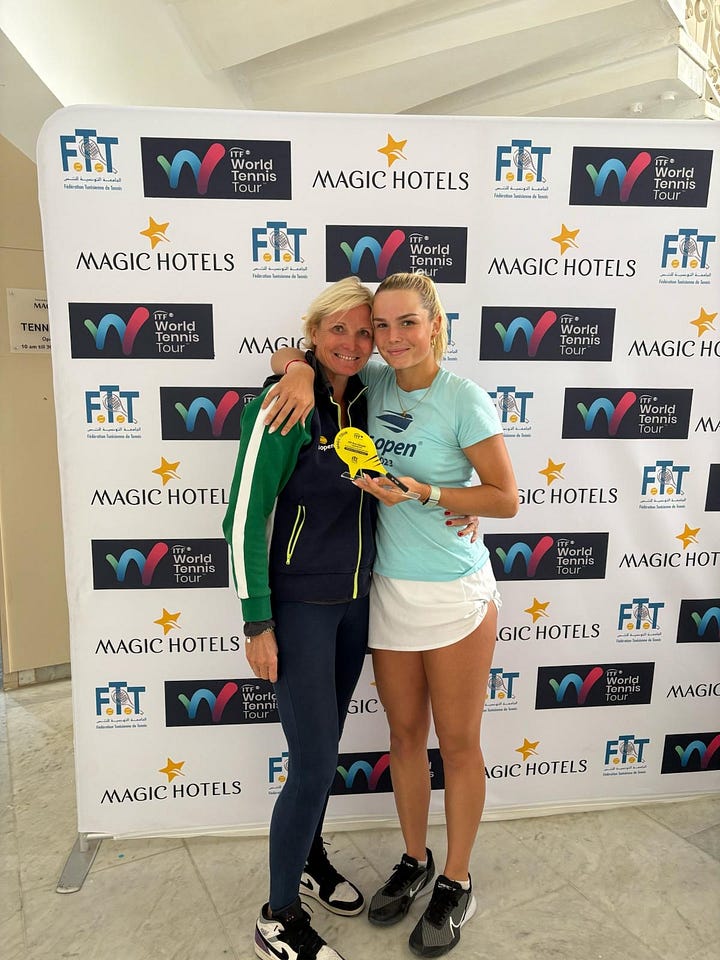
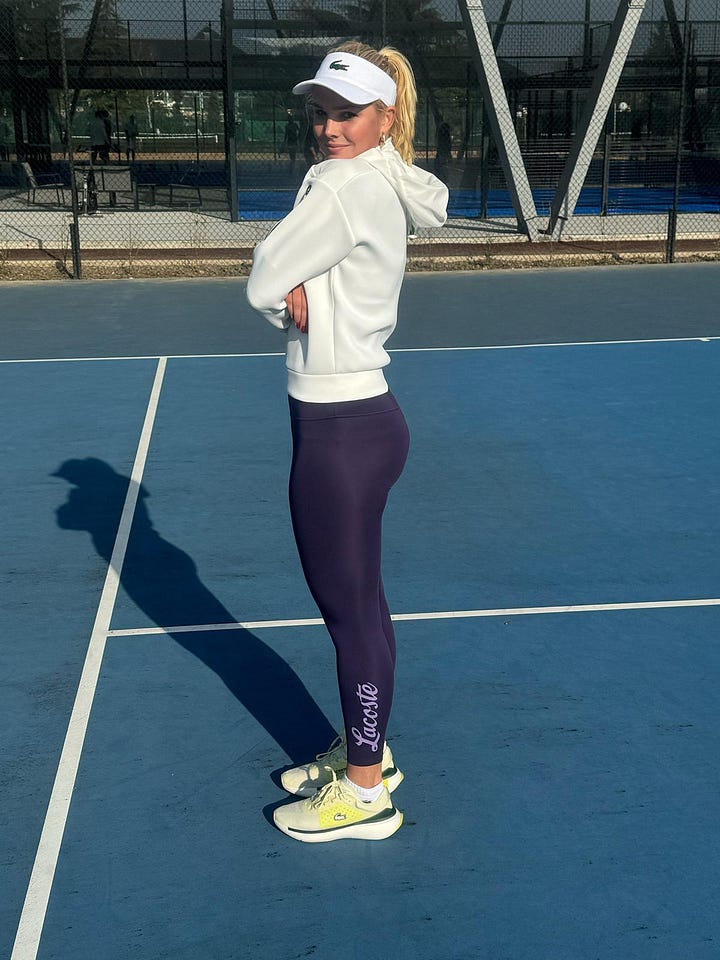
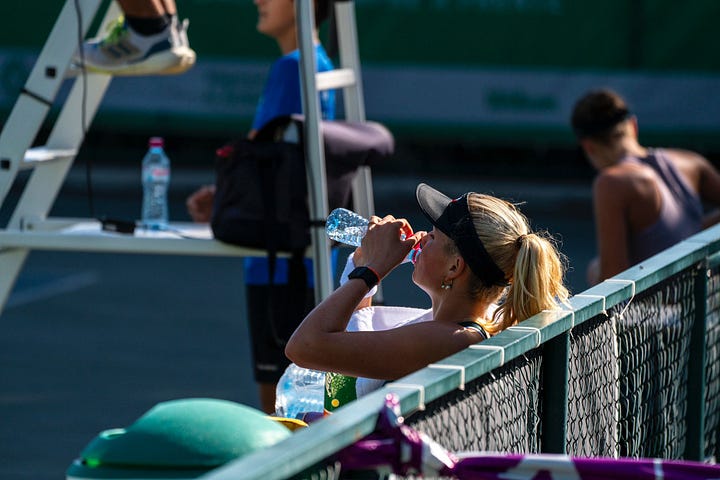
Carole Bouchard, The Tennis Sweet Spot: There are examples of players who have achieved a lot of success by taking the family project approach, but we know that it's a huge investment. Has it been an obvious thing? Have there been moments when you wondered if you needed help?
David Reguer: Well, first of all, it's true that it's something that is quite frequent on the Tour; we see them a lot, and it's something that is perhaps a little less in the French culture. But in the US, there’s even a movie about it on Netflix with the Williams sisters, so… (He smiles) In France, it's a little different. In France, we face more difficulties within the French system in taking this path into account. And yet, on the international level, when we discuss with families from other countries, it's not even a topic.
“Having such a strong project that makes us all happy brought us closer,” Katia Reguer
But, in the end, if we hadn’t decided to be at her side, as she did not fit into the system’s criteria, the project would have stopped when she was 8-10 years old. If there is no environment and no selection, then everything stops. It was, in the end, a chance to build ourselves like that. And then, we’ve opened up: We’ve had a physio for years who accompanies her. We also have a doctor who is a former doctor of other high-level sports, who has been following her for years. Now we have a fitness trainer. And then, of course, we take advice. Sometimes it works, sometimes it doesn't, but in any case, we try to open up as much as possible and to exchange as much as possible with other teams, with different nationalities, by looking and trying to understand.
Carole Bouchard, The Tennis Sweet Spot: As a mother, what does it mean to coach your daughter?
Katia Reguer: I try. I think I managed well the fact of sharing the Mom and coach roles. Oh, I love it. I love it. For me, on the court, I'm not Mom, I'm the coach. Alyssa has been accepting it from an early age, as I explained to her. That's how it is. It doesn't stop me from loving her more than anything else in the world, even on the court, but I'm the coach. But outside of the court, I'm really just her mother.
Carole Bouchard, The Tennis Sweet Spot: The experience you had at a high level is something that was essential for Alyssa…
Katia Reguer: Yes, but I stopped when I was a junior. I was very good in juniors. I was in the national junior team in Russia. I stopped when I was 18 due to an injury because it was at a time when we didn't come back from that. Once injured, it was over. So my experience is really more as a coach, as I’ve been working for more than 30 years. It’s good because it means Alyssa is not the first, so I know what it's like to work with players of her age.
David Reguer: Alyssa, for example, why was she injured? Because she grew up suddenly. She was the smallest, and she grew up in one go, and so that’s also why she started getting hurt. These are things we were aware of, and we knew it wouldn’t be a big deal, but in another context than a family project, she would have been put aside.
Katia Reguer: For example, regarding her growth delay, I did the tests, and it was all planned. I knew she was running two years late. Obviously, I managed it because I knew that even if the child was 14, her body was still 12, so I adjusted the physical efforts demanded accordingly.
“I knew that even if the child was 14, her body was still 12, so I adjusted the physical efforts,” Katia Reguer
Carole Bouchard, The Tennis Sweet Spot: Without you, Alyssa at 10 or 12 might have stopped playing…
David Reguer: No, she could have kept the racket. But she’d have just become a very good club player. It was impossible in any other way than the family project way. From the moment she was 8, if we hadn't been there, it would have been difficult when they made the selection according to their criteria. It's complicated, but actually it's more of a chance in the end.
BUILDING AND JUDGING SUCCESS
Carole Bouchard, The Tennis Sweet Spot: Are there like markers where you say this is where I want to be, that's what I want to do, so you can judge the progress.
Alyssa Reguer: Personally, I don't set limits. I don't like setting rankings at a certain age or whatever. I like not setting limits because I think I can go very high, very far, and I'm just going to focus on what I can control: What I do on a daily basis, the discipline, the work, and then the results will follow. I can only control what I do on the court, and that's why I don't set limits. I'm going to try, and often when you don’t set barriers, that’s when the best results come.
David Reguer: Of course, everything around is getting you back to the need of having results. So the work we are trying to do is to get detached from that progressively and to say that everything is open. On the other hand, we focus on the identity of the game, on the fact that the joy of playing is always superior to the rest, because it is a fundamental element. Of course, we are aware that it takes discipline to achieve that. But it is really pleasure, identity, and discipline that we are trying to develop.
Carole Bouchard, The Tennis Sweet Spot: Being outside of the federation system, you’re also losing out on wild card opportunities for bigger tournaments. On some financial help, too. Do you find it a shame not to have, with your ranking at your age, a little extra push?
Alyssa Reguer: I had some federal help with the former team, even when I was injured, but from the new team, for three years already, I don't know why, they decided that they had chosen their players, regardless of the ranking because today I am the French No1 in my age group, and I was in junior too. Yet I have neither access to CNE, for example, nor financial help, nor wild cards. I haven't had a single wild card in three years, despite requesting it. (Since our interview, Alyssa got one wild card for the ITF W75 de Calvi).
David Reguer: But at the same time, frankly, I think it doesn't matter, because there are plenty of countries where there are no big tournaments and still girls succeed. So I don't think you should be attached to that at all. On the other hand, we have a very good relationship with a certain number of people at the federation. There is no problem. Afterwards, we respect their choice; they have their own criteria. And it works for some of them. So we need to detach ourselves from that and move on. In any case, the day we have a wall card, we will say thank you. And then today we don't have one. If there is none, it's okay.
Alyssa Reguer: It won't prevent me from improving. It's okay.
David Reguer: We have to move forward.
Carole Bouchard, The Tennis Sweet Spot: It seems sponsors have supported you well. I remember the first time we met, it was through Le Coq Sportif. Now you’re with Lacoste. It costs a lot to finance a tennis career, so you also had to get into that marketing side quite early, no?
Alyssa Reguer: I have my dad, who takes care of that in my project. He takes care of everything related to brands, sponsors, marketing, and communication. I only try to focus on what I can do on the court. On the other hand, I have Yonex, who has been with me for about four years, with whom I have a very good relationship. They have stayed with me for the two years I've been injured. I let my team manage everything that is around me. I focus on working on the court.
David Reguer: She will also join the young talents of Mitsubishi Electric. It's quite important. They have a young talent program, and so there’s a grant, and it helps. She is very happy to be with Lacoste. So, yes, we try to also work on that so that she already has these partnerships while she’s moving up the ranks.
It's also true that we are lucky because what costs a lot in these projects is the coach. But we have the coach at home. Katia's contribution to the project is fundamental. She’s also starting to earn some prize money, and we have the team competition in France and Germany. We’re finding a balance.
Carole Bouchard, The Tennis Sweet Spot: I don't know if there are other families with the same projects who are in contact with you?
David Reguer: In France, no.
Katia Reguer: Avec Safin, oui. Avec sa maman.
David Reguer: There are exchanges. But in France, there isn't much of that transmission. We had great meetings with Patrice Hagelauer and Virginia Ruzici. We had meetings where we shared ideas. Pierre Barthès.
Alyssa Reguer: Pierre Barthès helped me a lot.
David Reguer: When she was younger, he was very nice to her. So, even if sometimes we have our own paths, we still have meetings with people who are very positive and who help us at some point.
Carole Bouchard, The Tennis Sweet Spot: Did that help you find your identity more quickly? Because no one imposed it on you. Your mom coaches you, so you might have more freedom. Did that help you build your game the way you wanted to?
Alyssa Reguer: It's true that since I was very young, I have always liked to hit the ball hard, hit winners, and be a tough competitor. I was only 8 years old, but I always kept that. Over the last few months, I've been doing a fundamental job on my identity as a player. I've been learning how I want to be on the court, what my strengths are, and what I have to work on. Really being Alyssa on the court and not anyone else.
“I've been doing a fundamental job on my identity as a player. Really being Alyssa on the court and not anyone else.”
It's true that I know that sometimes, being in a federal environment or an academy, coaches ask you to take a step back and avoid taking too many risks, depending on the culture and country. It's not always easy, but I think I was lucky to have my own project and a team that always supported me. We were able to work on my identity as a player, allowing me to be whoever I want to be on the court, rather than having to fit into a box.
Carole Bouchard, The Tennis Sweet Spot: Are there players who serve as a model?
Alyssa Reguer: I don't really have players who are my idols, even though I love watching tennis and draw inspiration from many of them. If I see the service of Rybakina, I tell myself, it's interesting what she does, she serves very well, I can use this, or the defense of Mirra Andreeva.‘ I try to take a little from all the players. I love Djokovic, I even have a poster of him in my room. I'm really very, very, very fan of him.
Carole Bouchard, The Tennis Sweet Spot: When are you going to tell yourself ok, we succeeded, we made the right choices, and it's a beautiful ca’?
Alyssa Reguer: You can't estimate success by the “winning a Grand Slam” or “Being Top 100” scales. You can't really set a goal for success. I believe that success, in general, is about being happy and doing what we do well and what we love in life. Of course, earning a living to be free, too. So, there is no barrier, there is no goal. I'm not telling myself I will succeed or fail if I win a Grand Slam title. It's just a job, a long-term project.
David Reguer: Sometimes, we look back and we laugh so hard, remembering a moment at a tournament in Belgium where she was, I don't know how old, and it was that moment that was the good moment. The problem in this kind of project is to completely forget that because you’re so deep in the whole thing. So, I think that what we are already succeeding in doing is living all these moments. Otherwise, we're always in this race of what’s the next big thing to do.
Alyssa Reguer: If you're never really satisfied with a result or a ranking, if it’s never enough, then you're never really happy, and you're always chasing something; it becomes an infernal cycle. So I prefer not to set a barrier and just be here, working, taking pleasure in the intermediate victories.
Carole Bouchard, The Tennis Sweet Spot: There are numerous discussions in tennis nowadays about mental health and pressure. Is it something you've been keeping an eye on with Alyssa? Even someone like Iga Swiatek, who should be one of the definitions of tennis success, has recently shown how hard it can be, even at the top.
David Reguer: That's exactly that. That's what we're trying to discuss and explain to Alyssa. There will always be a new context that puts additional pressure and introduces new goals. I hope, with all my heart, that Alyssa will have a career where the pleasure and joy will be higher at the end of the day than the moments when she was unhappy because she lost or didn't get what she wanted. We see it with a lot of players, like Caroline Garcia, that when they reach such a high point and have to set new goals, then sometimes there’s no more pleasure of being on the court because the pressure is too strong. That's what we've been trying to work on for several years to develop and cultivate that state of mind.
“I hope Alyssa will have a career where the pleasure and joy will be higher than the moments when she was unhappy because she lost or didn't get what she wanted,” David Reguer
Alyssa Reguer: I'm going to lie if I don't say that as a player, I don't dream of winning a Grand Slam title. Of course, I dream of playing and winning a Grand Slam. You have to dream because you invest so much time, so much effort, that if you don't dream, it's complicated. But yes, of course, one day my dream is to play the Grand Slam events, keep traveling, earn a living with it, and raise trophies. That's what makes me vibrate.
ANY ADVICE?
Carole Bouchard, The Tennis Sweet Spot: If you were around a table with another family, and they had a ten-year-old kid who dreams of becoming a professional player, what kind of advice could you give?
David Reguer: It depends on the family. It's not as simple as a question. First of all, do parents know tennis? There is this dimension. If the parents don't know tennis, there will often be one of the parents who went to a high level in another sport. If not, you'll need a bit of luck. The child would also need to be good quite early to have a chance to get into a system that will help them. In general, it's really important to develop a game identity that most closely corresponds to the person's identity.
It's true that from time to time, maybe with Alyssa when she was younger, there were people around us who said that she hit too hard and took too many risks, that she should focus on keeping the ball inside the court. We said, No, that’s fine. Maybe we won't win right now, but that’s fine.
Alyssa Reguer: Maybe I wasn’t going to win everything in juniors, but later…
David Reguer: And anyway, it was what suited her. So one of the tips would be to get to know the person as a human being and try to respect their identity. Then, not to give an objective... It puts things in your head. From an early age, especially in France, we have ranking, and it becomes an identity. So, get out of that. Get out of the rankings, the barriers, etc. I think Alyssa expresses that by saying we don't set a limit. She has the right to dream. In any case, don't give yourself that limit. It's a tip I would give. You also must be clear about your commitment and your discipline. Social life will be different, as for families who decide to do that, even if they don't train the kid, it will have significant consequences.
Katia Reguer: You have to be around good people you trust. You have to keep them. A good team counts a lot. You have to believe. Don't overthink. Just move forward. You're going to succeed.
Read more about what it takes to become a professional tennis player here with the interview of Wendy C. Goldberg from the Amazon Prime tennis documentary, “Uninterrupted’s Top Class Tennis.”
SOME BREAK POINTS…
It didn’t take long, and nobody is surprised! Experienced coaches with a proven track record are rare these days, so when one is free, he gets snatched real quick. Mikael Tillström, who saw with surprise his collaboration with Gaël Monfils being terminated ahead of Roland-Garros, is already back on Tour. The Swedish coach, whom TSS readers know well, has now joined Canadian Denis Shapovalov’s team. Sweden is gaining ground in Shapovalov’s entourage as his fiancée, player Mirjam Björklund, is also Swedish.
How did it happen? Well, both had worked together for a few weeks last year in Sweden at the Good to Great Academy, but it couldn’t be more than that because Tillström was still the head coach of Monfils. So, logically, when Tillström found himself free, Shapovalov came back with an offer. Bye bye Janko Tipsarevic, welcome Mikael Tillström. Things can move very quickly in that sport. I’m really curious to see how Tillström, who’s also mentoring the German player Niels McDonald, who won Roland-Garros juniors, is going to be able to provide a frame to Shapovalov’s fire. That’s honestly all he needs, in my opinion, to get back to the top.
Another ATP coaching news here, and a bit of a surprise this time: Lucas Pouille, who is recovering from a severe injury and won’t be able to play until next year, has agreed to join Arthur Rinderknech’s team. They started after Roland-Garros, and it’s been working well as Rinderknech reached the quarterfinals at the Queen’s, beaten by Carlos Alcaraz (7-5, 6-4).
I want to believe that’s all genuine, but also it’s not my first tennis rodeo, so… How interesting it is that Aryna Sabalenka, who got some bad press after Roland-Garros, is now all over social media positively for sharing a hitting session with Jannik Sinner and another one with Novak Djokovic. The Italian had already shared court with a WTA player, Loïs Boisson, at Roland-Garros as he needed time on Chatrier. So, yes, it’s nice to see both World No. 1s sharing the court and the smiles. Whatever the (PR) reason. By the way, Sabalenka is also scheduled to hit with Coco Gauff on Friday.
Andy Murray is getting the statue treatment at Wimbledon! Sir Andy’s piece of tennis art will be unveiled “in 2027 as part of the celebrations of the Wimbledon championships’ 150th anniversary.” After Rafael Nadal at Roland-Garros, here comes Sir Andrew at Wimbledon.
WTA Ventures (commercial arm of the WTA) and Tennis Channel inked a new six-year media rights deal. “The Hologic WTA Tour will be available to tennis fans across the United States through Tennis Channel, its streaming network TennisChannel 2, its app, and website. The deal covers all WTA 1000, 500, and 250 events (except tournaments in the United States) through to the season-closing WTA Finals. (The network covers women’s events in the United States through other rights contracts.)”
Looking for some books to read this summer? Have you used your Spence code yet? Until July 7, you'll receive 15% off your entire order, with no minimum purchase requirement (one use per customer). What’s the code? sweetspot15. Enjoy!





